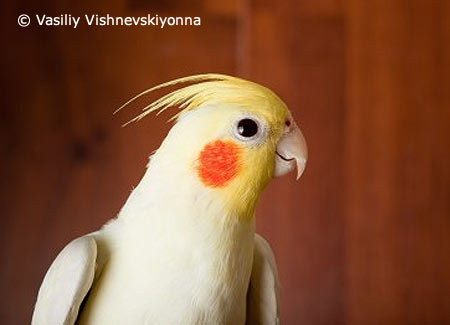Reasons Why Cockatiels Bite

Below are common reasons why a pet cockatiel may bite. Simply click on the biting topic below for more information. If you cannot determine why your cockatiel is biting with the information provided , please post your question on our parrot forum under the cockatiel section or head on over to our main cockatiel area.
- Reasons Why Cockatiels Bite
- Fearful Biting from a Cockatiel
- A Cockatiel Biting Out of Jealousy
- Cockatiel Territorial Biting
- Juvenile Biting in Cockatiels
- Reinforcement of Biting Unintentionally in Cockatiels
Reinforcement of Biting Unintentionally in Cockatiels
Many owners have unintentionally conditioned their birds to bite without even being aware they have actually reinforced this biting behavior. For example, if an owner holds up a mirror to an aggressive female cockatiel, in response to her reflection, the bird will persistently attack the reflection. The owner may laugh, praise the bird, and continue with this routine because they may believe the cockatiel is playing. If the owner asks the bird to step up unto their hand right after one of these sessions, he may get bitten due to the bird being in “a worked up” stage. If this process is constantly repeated, the bird will continue to react in an aggressive manner.
Another example of unintentional biting through accidental
reinforcement is when the owner tells the cockatiel, “We don’t bite”
after the bird has bitten them. The cockatiel does not understand what
the owner has said. Rather, any words uttered by the owner are looked at
as praise by the cockatiel. An owner should realize that cockatiels do
not understand our way of communication.
In examining how a cockatiel reacts when quarreling with another bird,
we see the birds sparring with their beaks. After the situation has been
resolved, the birds tend to fly away and continue what they were doing
or move on to something new. The birds do not try to explain their point
of view nor do they tell each other not to bite. Many owners believe
that somehow telling their birds not to bite will in some way make sense
to them.
Solution: Solving this problem is easy if the owner can recognize why
their pet cockatiel is biting. Though finding the exact reason might
take some time to figure out, the owner should document each biting
episode and stop reacting to the bites all together. This means if the
cockatiel should bite, the owner should simply move their hand back and
ignore being bitten. The owner should not react in any way; no direct
eye contact, no wobbling of the hand that shows uneasiness, no spraying
the bird with water, and no verbal reprimands. Once the cockatiel learns
that biting will get no reaction, it will start to minimize this
behavior. Eventually the bird will learn not to use biting as a way to
communicate with its owner.
When the cockatiel is acting as it should, the owner should immediately
praise it and reward it. Cockatiels are very smart birds and will adapt
their behaviors if their owners change their approach as well.
The owner should also practice tricks with their bird as this will help
to get the bird’s mind off of biting. In addition, if the owner
incorporates more tricks into the bird’s daily routine, this allows the
cockatiel to better understand its owner and thus makes the bird tamer.
To begin teaching the cockatiel to do tricks, the owner should do more
research on
positive reinforcement training in birds.




